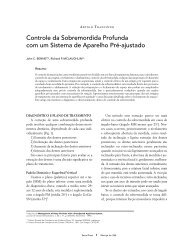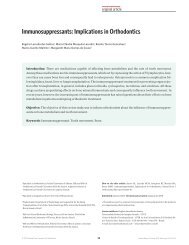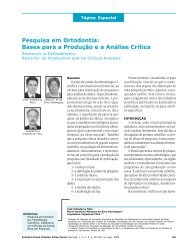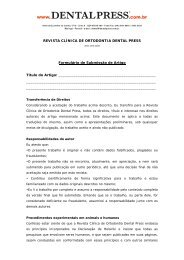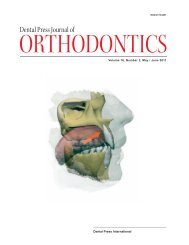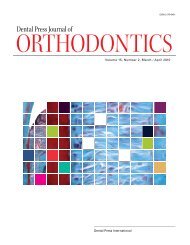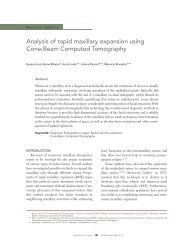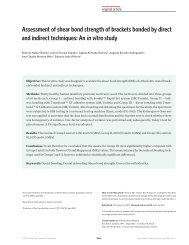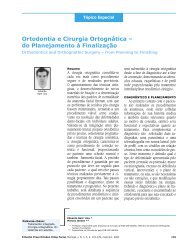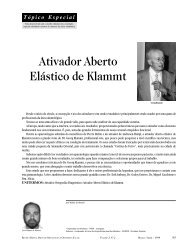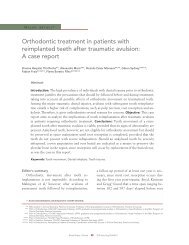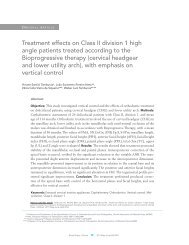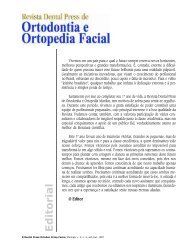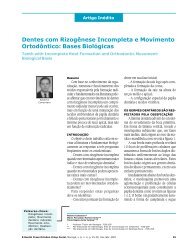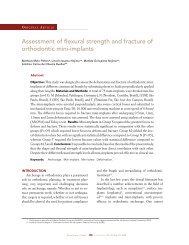[ original article ] A NiTi rotary instrument manufactured by twisting: morphology and mechanical propertiesinstruments manufactured by the machining process,corroborating the results obtained by Gambarini etal 13 and Larsen et al. 14 This can be explained by thefact that machining produces perpendicular defectsthat favor nucleation and propagation of cracks.Even presenting good results in flexion-bendingfatigue tests, the TF ® files should have a better surfacefinishing, that would improve the clinical performanceconcerning durability in relation to thefracture. The surface morphology found at this workwas very similar to that found by Kim et al. 12 Despitethe eletropolishing, the surface is not completely flatand has machining marks from the manufacturingprocess. This observation corroborates the resultsof that study.ConclusionsBased on the results we concluded that:a) the dimensions of the TF ® files meet the ANSI/ADA standard number 28 recommendations;b) the files present many defects from the manufacturingprocess;c) the instrument flexibility decreased with increasingtaper;d) the phase transformation induced by stress averageforces to the TF ® files of taper 0.04; 0.06 and0.08 mm/mm where 100 gf, 150 gf and 250 gf,respectively, ande) the TF ® Vickers microhardness values were similarto those of NiTi rotary instruments manufacturedby the machining process.© 2011 <strong>Dental</strong> <strong>Press</strong> Endodontics 26<strong>Dental</strong> <strong>Press</strong> Endod. 2011 apr-june;1(1):21-7
Vieira VTL, Elias CN, Lopes HP, Moreira EJL, Souza LCReferences1. Walia H, Brantley WA, Gerstein H. An initial investigation of thebending and torsional properties of nitinol root canal files. J Endod.1988;14(7):346-51.2. Lopes HP, Siqueira JF Jr. Endodontia: biologia e técnica. 2ª ed. Riode Janeiro: Guanabara Koogan; 2007.3. Thompson SA. An overview of nickel–titanium alloys used indentistry. Int Endod J. 2000;33:297-310.4. Schäfer E, Dzepina A, Danesh G, Münster B. Bending properties ofrotary nickel-titanium instruments. Oral Surg Oral Med Oral PatholOral Radiol Endod. 2003;96:757-63.5. Miyai K, Ebihara A, Hayashi Y, Doi H, Suda H, Yoneyama T.Influence of phase transformation on the torsional and bendingproperties of nickel–titanium rotary endodontic instruments IntEndod J. 2006;39:119-26.6. Hayashi Y, Yoneyama T, Yahata Y, Miyai K, Doi H, Hanawa T,et al. Phase transformation behavior and bending properties ofhybrid nickel-titanium rotary endodontic instruments. Int Endod J2007;40(4):247-53.7. Yahata Y, Yoneyama T, Hayashi Y, Ebihara A, Doi H, Hanawa T, etal. Effect of heat treatment on transformation temperatures andbending properties of nickel–titanium endodontic instruments. IntEndod J. 2009;42:621-6.8. Lopes HP, Elias CN, Campos LC, Moreira EJL. Efeito da frequênciada rotação alternada na fratura de instrumentos tipo K de NiTi. RevBras Odontol. 2004;61(3-4):210-2.9. Serene TP, Adams JD, Saxena A. A nickel-titanium instruments:applications in endodontics. St. Louis: Ishyaku EuroAmerica; 1995.10. Kuhn G, Jordan L. Fatigue and mechanical properties of nickel–titanium endodontic instruments. J Endod. 2002;28(10):716-20.11. TF Technical Bulletin - Part No. 077-3140 Rev. A - 2008.12. Kim HC, Yum J, Hur B, Cheung GSP. Cyclic fatigue and fracturecharacteristics of ground and twisted nickel-titanium rotary files.J Endod. 2010;36(1):147-52.13. Gambarini G, Grande NM, Plotino G, Somma F, Garala M, De LucaM, et al. Fatigue resistance of engine-driven rotary nickel-titaniuminstruments produced by new manufacturing methods. J Endod.2008;34:1003-5.14. Larsen CM, Watanabe I, Glickman GN, He J. Cyclic fatigue analysisof a new generation of nickel titanium rotary instruments. J Endod.2009;35(3):401-3.© 2011 <strong>Dental</strong> <strong>Press</strong> Endodontics 27<strong>Dental</strong> <strong>Press</strong> Endod. 2011 apr-june;1(1):21-7



